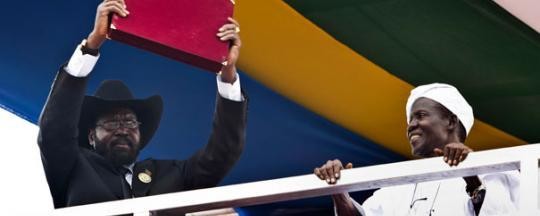The idea to introduce a federalist government system has resulted in heated debate in South Sudan. Leading politicians from around the country have pledged themselves for or against the system. But what exactly is federalism and what could it mean for South Sudan? Radio Tamazuj answers a few questions to help you better understand the issue.
What is federalism?
Federalism is a system of government that shares power and responsibility between a national government and local authorities in states, provinces, or counties. Federalist systems give local authorities more of a say in how their constituencies are governed. Typically, this means that the federal (i.e. national) government takes on responsibilities like foreign affairs, national defense, national parks, and large-scale infrastructure projects, while local governments handle things like education, health care, local infrastructure, and policing. A federalist system is contrasted with a unitary or national system that is dominated by a strong central government.
Which countries use federalism?
Many countries around the world use forms of federalist systems, including the United States, Australia, Brazil, Mexico, and India. Other African governments are also debating the use of decentralized governing systems. For example, Kenya implemented a new constitution last year that devolves governing capacities such as health care to 47 county governments. In Tanzania, a new constitutional review may give greater autonomy for the island of Zanzibar from the mainland. Somalia is trying to balance the establishment of its national government in Mogadishu with regional authorities in Somaliland, Puntland, and Jubbaland.
Does South Sudan have a federalist system?
Currently, South Sudan does not have a federal system, though the idea isn’t new. “Calls for federalism have been there for a long time,” said David Deng of the South Sudan Law Society speaking to Radio Tamazuj. “Initially they were a response from the south feeling marginalized within the national system of Sudan, and even leading toward independence.” Indeed, the 2005 Comprehensive Peace Agreement gave Southern Sudan a somewhat decentralized sub-national government, wrote constitutional law professor Kevin Cope. However, the revised 2011 constitution consolidated powers in the executive branch in Juba and expanded the powers of the national government. Today, South Sudan follows more of a unitary system.
What are the benefits of federalism?
Federalism has the advantage of bringing government closer to the people, says Deng. “Federalist systems are better suited to dealing with diversity,” he says. “Many people like the idea of governance that’s close to the people that’s able to deliver resources and a point of contact where people meet their government. In a place like South Sudan it’s very hard for the central to reach the peripheries.”
What are the drawbacks of federalism?
Deng says that federalism could damage national unity. “The question is, how do you maintain national cohesion and national identity while still empowering local constituencies?” he says. “The challenge in South Sudan is to find strength in diversity. There is a risk in a hasty rush to decentralize that one could lose that national cohesion.” In South Sudan in particular, federalism also brings up bitter memories of ‘Kokora,’ a movement in the early 1980s to divide the south into separate regions. Kokora resulted in many people from greater Bahr el Ghazal and greater Upper Nile being expelled from Equatoria.
Who is for and against federalism in South Sudan?
Those in favor include SPLM-In Opposition leader Riek Machar and the governors from the three Equatorian states, while President Salva Kiir and many politicians in the greater Bahr El Ghazal region strongly oppose federalism.
Could federalism be established in South Sudan anytime soon?
Though federalism is being hotly debated right now, it is unlikely that an entirely new governing system would be implemented in the short term. Establishing federalism could require major changes to the constitution that probably cannot take place in the midst of a civil war. “The peace agreement between two warring groups is not the context to decide a system of government,” says Deng. “To really move on that requires a much more broad process that involves people all over the country.”
File photo: President Salva Kiir holds up the constitution on Independence Day, 9 July 2011




